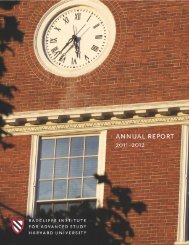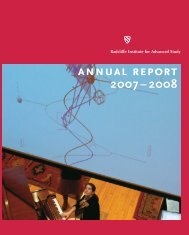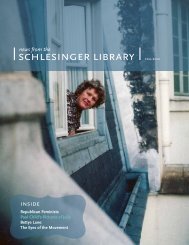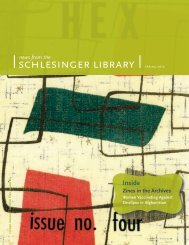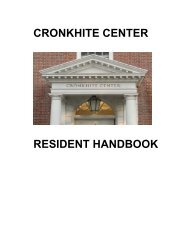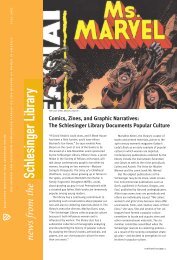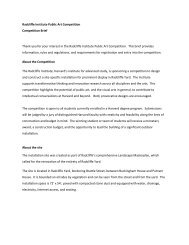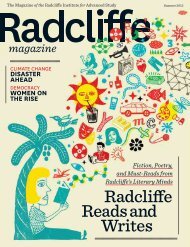Download PDF Version - Radcliffe Institute for Advanced Study
Download PDF Version - Radcliffe Institute for Advanced Study
Download PDF Version - Radcliffe Institute for Advanced Study
You also want an ePaper? Increase the reach of your titles
YUMPU automatically turns print PDFs into web optimized ePapers that Google loves.
September 2005<br />
8–13<br />
Fellows’ Arrival and Orientation<br />
Works-in-Progress<br />
“One might think an operations researcher on sabbatical would<br />
prefer to interact with others from the same discipline, or at the<br />
very least, with other scientists and engineers,” said <strong>Radcliffe</strong> fellow<br />
Anna Nagurney, a mathematician from the University of Massachusetts<br />
at Amherst. “But some of the most interesting questions after<br />
my seminar came from nonscientists, and some of the presentations<br />
that I found most profound and even haunting were by the<br />
nonscientists.”<br />
In this reflection, Nagurney describes an experience that occurs<br />
again and again at the <strong>Radcliffe</strong> <strong>Institute</strong>: intense learning across<br />
disciplines and the arts. One of the many venues <strong>for</strong> these<br />
exchanges is the weekly fellows’ presentations, which occur every<br />
Wednesday during the academic year.<br />
Held in the third-floor Colloquium Room on Concord Avenue, fellows’<br />
presentations ranged this past year from a discussion of biblical<br />
satire in the eighteenth century to the legal rights of today’s<br />
prisoners. Each member of the group of ten creative artists, sixteen<br />
humanists, thirteen social scientists, and twelve natural scientists<br />
presented his or her work-in-progress to <strong>Radcliffe</strong> colleagues and<br />
the wider Harvard community.<br />
Judith Vichniac, director of the fellowship program, introduced fellows<br />
be<strong>for</strong>e their presentations, providing background and context<br />
<strong>for</strong> listeners. She described several highlights of the past year’s<br />
presentation calendar. Artist Ann Carlson gave an overview of her<br />
interdisciplinary work that included dancing (“We’re never not<br />
dancing,” Carlson claims) and discussed how things become commodities<br />
or consumer goods in American life.<br />
Three fellows presented work on different aspects of slavery. Tera<br />
W. Hunter, who held a Mary I. Bunting <strong>Institute</strong> Fellowship, presented<br />
research on black marriages among slaves, free blacks, and<br />
ex-slaves during the nineteenth century. Eve M. Troutt Powell,<br />
who held the Sargent-Faull Fellowship, discussed her work on Saint<br />
Josephine Bakhita, a Sudanese woman kidnapped and sold as a<br />
slave in the nineteenth century. And Vincent Brown, the Lillian Gollay<br />
Knafel Fellow, talked about Jamaican slave society.<br />
Another high point in the fellows’ presentations was materials scientist<br />
Rachel S. Goldman’s discussion of her research on energysaving<br />
technologies. Goldman, who held the Augustus Anson<br />
Whitney Fellowship at <strong>Radcliffe</strong>, used a scanning tunneling microscope<br />
in the basement of Harvard’s Bauer Laboratory to conduct<br />
her research.<br />
<strong>Institute</strong> Celebrates Pulitzer Wins<br />
The <strong>Institute</strong> celebrated on April 19 when a current and a <strong>for</strong>mer<br />
<strong>Radcliffe</strong> fellow were honored with Pulitzer Prizes. Geraldine<br />
Brooks, who held the Vera M. Schuyler Fellowship at <strong>Radcliffe</strong>, won<br />
in fiction <strong>for</strong> her novel March (Viking, 2005); and Caroline Elkins RI<br />
’04, now the Hugh K. Foster Associate Professor of African Studies<br />
in the Faculty of Arts and Sciences at Harvard, won in nonfiction<br />
<strong>for</strong> Imperial Reckoning: The Untold Story of Britain’s Gulag in Kenya<br />
(Holt, 2005). While other <strong>Radcliffe</strong> and Bunting fellows have won<br />
Pulitzer Prizes, this was the first time that two<br />
fellows received the awards simultaneously.<br />
Homi Bhabha and Theda Skocpol Join <strong>Institute</strong> as Senior<br />
Advisors<br />
Homi K. Bhabha RI ’05 and Theda Skocpol AM ’72, PhD ’75, distinguished<br />
members of Harvard’s Faculty of Arts and Sciences, joined<br />
the <strong>Radcliffe</strong> <strong>Institute</strong> as senior advisors this past year. Bhabha, the<br />
Anne F. Rothenberg Professor of English and American Literature<br />
and director of the Humanities Center, became the <strong>Institute</strong>’s<br />
senior advisor in the humanities on July 1, 2005. He was a <strong>Radcliffe</strong><br />
<strong>Institute</strong> fellow in 2004–2005 and served as a faculty associate at<br />
the <strong>Institute</strong> <strong>for</strong> three years be<strong>for</strong>e becoming a senior advisor.<br />
Skocpol, dean of the Graduate School of Arts and Sciences, is<br />
the Victor S. Thomas Professor of Government and Sociology and<br />
director of the Center <strong>for</strong> American Political Studies. She was<br />
named the <strong>Institute</strong>’s senior advisor in the social sciences effective<br />
January 1, 2006. Both professors hold three-year appointments at<br />
<strong>Radcliffe</strong>.<br />
12<br />
www.radcliffe.edu



